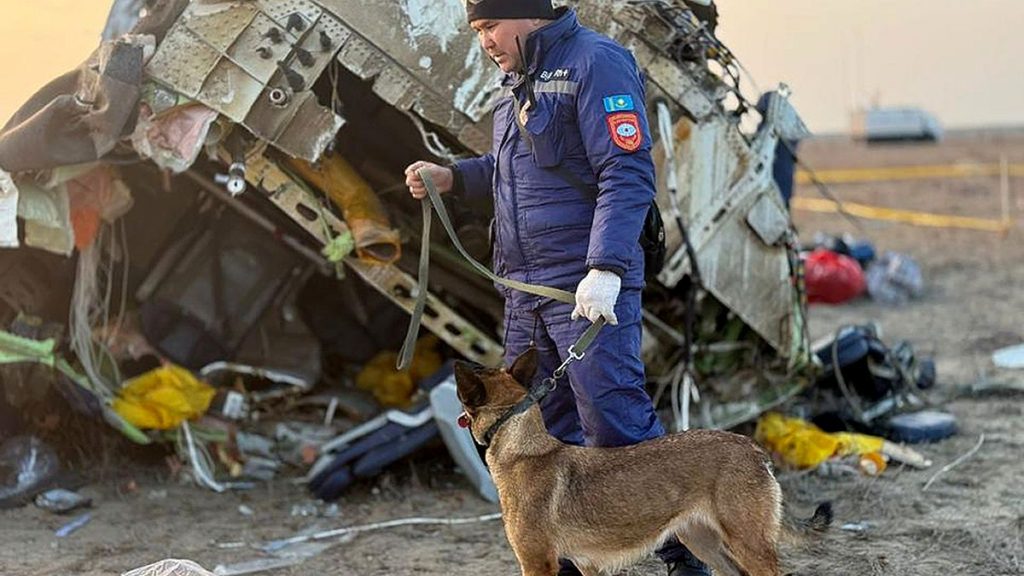The tragic Christmas Day crash of an Azerbaijan Airlines flight en route from Baku to Grozny has sparked a complex web of speculation and official pronouncements, with significant discrepancies emerging between the narratives presented by authorities in Azerbaijan, Russia, and Kazakhstan, and information circulating within Azerbaijani media circles. The official stance across all three countries has been one of cautious reserve, emphasizing the need for a thorough investigation before any definitive conclusions are drawn. However, leaks from Azerbaijani government sources to Euronews have introduced a dramatic new element, alleging the aircraft was struck by a Russian surface-to-air missile, an assertion that has been corroborated by independent Azerbaijani news outlets. This starkly contrasts with the initial explanations offered by Russian authorities, attributing the crash to a bird strike. Kazakhstan, meanwhile, remains in a position of relative uncertainty, awaiting official explanations from both Russia and Azerbaijan while grappling with conflicting reports circulating in its own local media.
The official Russian response to the tragedy has been characterized by a steadfast refusal to engage in speculation. The Kremlin, through its spokesperson Dmitry Peskov, has underscored the necessity of a comprehensive investigation by specialized authorities before any hypotheses regarding the cause of the crash are considered. This cautious approach has been echoed by Rosaviatsia, the Russian aviation authority, which, alongside Azerbaijan Airlines, initially suggested a bird strike as the likely culprit. Furthermore, their narrative indicates that the flight was initially diverted from Grozny to Makhachkala due to fog, and subsequently rerouted to Aktau in Kazakhstan due to an unspecified emergency. This official narrative avoids any mention of missile involvement, directly contradicting the information emerging from Azerbaijani sources.
The Kazakh government’s position reflects a more neutral stance, with authorities openly acknowledging their ongoing communication with Azerbaijan while admitting they have yet to receive a formal explanation for the crash from either Azerbaijan or Russia. Deputy Prime Minister Kanat Bozumbayev, who is leading the Kazakh investigation, has stressed the importance of relying on verifiable information and refraining from endorsing any specific theories until official reports are received. In contrast to this cautious official stance, local Kazakh media outlets have presented varying accounts, including a report from Orda.kz suggesting an oxygen cylinder explosion following a bird strike, and another highlighting potential “shelling marks” observed on the salvaged fuselage sections. However, these media reports have been dismissed as speculative by Kazakh authorities, reinforcing the official emphasis on awaiting the results of the official investigation.
The Azerbaijani response to the tragedy has been marked by a notable divergence between official statements and information attributed to government sources. President Ilham Aliyev has publicly stated that the cause of the crash remains undetermined, acknowledging the possibility of various contributing factors. Official information provided to the president indicates the flight diverted to Aktau due to unfavourable weather conditions. However, this official narrative is sharply contradicted by the information leaked to Euronews and subsequently confirmed by two independent Azerbaijani media outlets, AnewZ and Caliber.az. These sources allege the aircraft was struck by a Russian Pantsir-S air defense system, characterizing the incident as unintentional but demanding accountability from Russia. They assert Baku expects Russia to acknowledge the missile strike and conduct a transparent investigation, ensuring justice for the victims and their families.
The diverging narratives surrounding the Azerbaijan Airlines crash underscore the complex geopolitical dynamics at play. The official pronouncements from Russia and Kazakhstan emphasize caution and the need for thorough investigation, effectively distancing themselves from the more explosive allegations emerging from Azerbaijani sources. The leaked information alleging Russian missile involvement, if substantiated, would significantly escalate the situation, potentially straining relations between the countries involved. The insistence by Azerbaijani media outlets on demanding accountability from Russia adds a further layer of complexity, highlighting the potential for this tragedy to evolve into a diplomatic crisis.
The conflicting reports and the absence of a unified official explanation raise crucial questions about transparency and accountability. The discrepancy between official narratives and leaked information underscores the challenges in obtaining accurate and timely information in the aftermath of such incidents. The involvement of three different countries further complicates the investigative process, creating potential for conflicting interests and interpretations. As the investigations unfold, the international community will be closely watching how these conflicting narratives are reconciled and whether a credible and comprehensive explanation for the tragedy can be established. The demand for accountability from Azerbaijani sources adds further pressure for a transparent and impartial investigation to determine the true cause of the crash and ensure justice for the victims.

